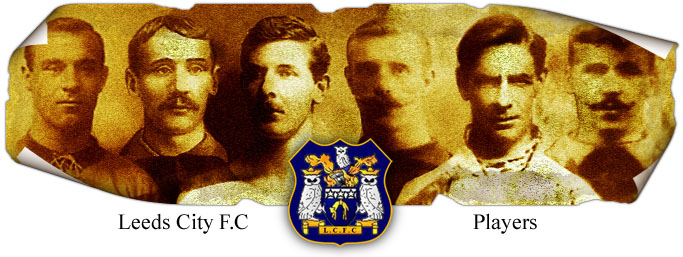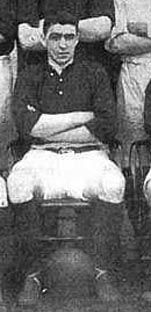

Bowman: Adam
1908-1909 (Leeds City Player Details)
Centre Forward
Born: Forfar, Angus: 04-08-1880
Debut: v Tottenham Hotspur (h): 05-09-1908
5’11” 12st 0lb (1908)
Bowman started his football career in his native Scotland with St Johnstone and then in 1900-01 he made one appearance for East Stirlingshire. He then had a
period with St Bernard's in 1901, before returning to East Stirlingshire in 1901 scoring ten goals in just ten appearances. This brought the scouts from Everton and he
moved to the English First Division side just prior to the 1901-02 season and although the Toffees challenged for the title, Bowman had to be content with just four games
in which he scored his first goal for them. His debut came at inside-left in an FA Cup-tie at Anfield against Liverpool on 25th January 1902; Bowman thus became the
first and last Everton player to make his debut in the Cup against their Mersey rivals. The Blues earned a 2-2 draw. He made his second appearance in the replay five
days later when Everton failed to take ground advantage as Liverpool triumphed 2-0 at Goodison Park. He went on to make his League debut a few months later as
Everton won 1-0 at Small Heath on 22nd March 1902. It was enough to ensure he kept his spot for the home game against Derby County which again saw Everton win
2-0 at Goodison, and followed that up, two days later, with a 1-0 win over Nottingham Forest at Goodison. His fourth League appearance, in a 1-1 draw with Wednesday
at Hillsborough on 5th April 1902, saw him score his first and only goal for the Toffees. The following season again saw little improvement for him as he scored twice in
five games. He did not play his first game, that season until 11th October 1902 in a 4-2 home win over Grimsby Town, where he scored the last two Everton goals in his
season's debut in front of 14,000! It proved to be his only goals of the season for the Toffees, even though he started four more games.He maintained his position for
their 1-2 defeat by Aston Villa at Villa Park seven days later. He was then dropped and did not return until 6th December 1902 at Hillsborough where they were soundly
defeated 4-1 by Wednesday which meant another stint in the reserves. He was recalled on 31st January 1903 as Everton beat Sheffield United at Goodison and he
brought his tally for the season to five when Everton were beaten 0-1 by Aston Villa at Goodison Park. He had scored three goals in nine League games and two F.A.Cup
ties at Goodison. He was the leading goalscorer for the Everton Reserves with nine goals in 1902-13 season. Blackburn Rovers were in dire need of a trusted goal-scorer
as they were deep in relegation trouble and they persuaded him to join them in March 1903. With only a couple of games to play, Bolton Wanderers were already relegated.
The battle was between Blackburn Rovers and Grimsby Town for the second club to take the drop into the Second Division. On Easter Monday, Blackburn had to visit
Bowman's former club. They surprisingly beat Everton 3-0 with Bowman scoring two of the goals. Four days later, Bowman scored another two goals in a 3-1 victory over
Newcastle United. These two results meant that Grimsby Town, rather than Blackburn Rovers was relegated from the First Division. Rumours began to circulate that
Blackburn Rovers had bribed Everton players to lose the game. Officials at Grimsby lodged an official protest and the FA decided to hold an inquiry into the game. A report
by the FA claimed that there was evidence that the Blackburn Manager, Joseph Walmsley, had tried to arrange a win for Blackburn Rovers. However, they believed that the
Everton players had not taking any bribes and that the final League standings should remain unaltered. Walmsley was immediately banned from having any further
involvement with football. Bowman had scored five times in just seven games since joining the club and those goals had saved Rovers from relegation. The club eventually
finished in fifteenth place in the League in 1903-04, as Bowman scored seven times in seventeen games. In July 1903, Robert Middleton, a former school teacher, was
appointed as Blackburn's new secretary/manager. Middleton purchased Bob Evans, a Welsh international goalkeeper, from Wrexham for £150. In November, 1903,
Middleton also persuaded Fred Pentland, a regular goalscorer for Blackpool, to join the club. Pentland scored seven goals in eighteen League appearances, but his efforts
could not stop Blackburn from being involved in another relegation struggle. The club eventually finished in fifteenth place in the league. Lionel Watson was the club's top
scorer with fourteen goals. It was the same story the following season. Despite good individual performances from Adam Bowman, Bob Crompton, Bob Evans, Fred
Blackburn, Arnie Whittaker and Fred Pentland, Blackburn could only finish in thirteenth place. Despite trying to buy their way out of trouble with expensive signings, it was the
same story the following season. Despite good individual performances from Adam Bowman, Bob Crompton and other Blackburn stars, they could only finish thirteenth.
Bowman was the top scorer with thirteen goals from thirty-one games. He repeated the feat in 1905-06 with fifteen strikes in thirty-two matches. These feats could not revive
Rovers and, despite the club bringing in a number of expensive signings, they continued to struggle at the lower end of Division One. In an article that appeared in the
Blackburn Times a journalist wrote:"Like its two predecessors, the season of 1904-05 has been one of disgrace to the Rovers". In April 1905, Robert Middleton signed
Welsh international striker, Billy Davies from Wrexham. At the same time, two of Blackburn's best players, Lionel Watson and Fred Blackburn, joined West Ham United.
Blackburn, an English international, left because he was upset with the decision not to grant him a benefit. Blackburn Rovers finished in 9th place in the 1905-06 season.
Adam Bowman was once again the club's top scorer with fifteen goals. His strike partner, Billy Davies, added eleven more. Bowman only played a few more games before
moving to Brentford in the Southern League. During his time at Blackburn he had scored forty-three goals in ninety-nine games. Adam Bowman was once again the club's
top scorer with fifteen goals from thirty-two games. Bowman only played a few more games before, in May 1907, he dropped into the Southern League when he signed for
Brentford. During his time at Blackburn he had scored forty-three goals in ninety-nine League games. He was only at the London club for just over a season but notched
twenty-two goals in thirty games, including one goal in the F.A. Cup-ties. Before signing for Leeds he had made that twenty-five goals in forty-four appearances in all games.
It was form which attracted the attention of new Leeds City manager Frank Scott-Walford, who signed him up in May 1908, when he was twenty-eight years old and in the
final stages of his career. He scored six goals in fifteen games for City but never seemed to establish himself ahead of Billy McLeod, Tom Rodger and Jimmy Gemmell as a
regular striker. Scott-Walford, censured whilst in charge at Brighton and Hove Albion for some disreputable moves in the transfer market, was criticised by the League
Management Committee for his part in the Bowman deal. The minutes recorded as follows: "In accordance with the resolution passed at the previous meeting, Frank Scott-
Walford of Leeds City, attended, and reported that he had arranged with Blackburn Rovers for the transfer of Bowman. The Committee expressed strong disapproval of the
line of action pursued by Frank Scott-Walford in regard to the steps taken to obtain the transfer, and administered a caution." Bowman showed up well in pre-season trials
for City, snatching a hat-trick as the prospective first team beat the reserves by five goals to nil. The Mercury reported that he "was repeatedly in evidence, and proved
himself a deadly shot, who should do much to remedy the old weakness in front of goal." Bowman appeared at centre-forward with Billy McLeod partnering him at inside-left,
but for the most part that season it was McLeod who led the line. After playing in seven of the first ten games, Bowman lost his place and made only another eight
appearances in the League, registering six goals. He was brought into the side for the F.A.Cup game against West Ham in February and scored as City lost 2-1 after extra
time. After failing to establish a first team place. In the 1908-09 season Bowman scored six goals in fifteen games for Leeds City. He never played League football after
departing Elland Road, playing for Portsmouth in the Southern League from November 1909 and Forfar Athletic in 1910-11 and Leith Athletic in 1911-12, in his native
Scotland. He captained his home-town team from Centre-Half and scored six in seventeen appearances while with Leith Athletic. He returned to England with Accrington
Stanley in March 1912 before finally retiring from the game. After his career was over he became a licensee in Blackburn a position he held for twenty-five years. He died in
Blackburn on 4th February 1937, aged fifty-six.
| Appearances | Goals |
| League 15 | 6 |
| F.A. Cup 1 | 1 |